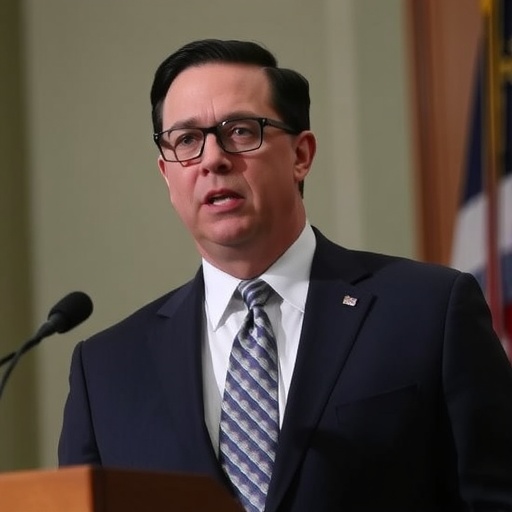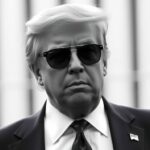Trump Nominee Paul Ingrassia Under Fire: Leaked Messages Expose Racist Remarks and Nazi References in Special Counsel Controversy
In a bombshell development that has rocked the political landscape, Paul Ingrassia, Donald Trump’s nominee for Special Counsel, is facing intense scrutiny after leaked messages surfaced revealing deeply troubling racist remarks and allusions to a ‘Nazi streak.’ The controversy erupted late last week when anonymous sources released private chat logs from online forums and messaging apps, painting a picture of inflammatory rhetoric that clashes starkly with the impartiality expected of a high-profile legal role. As calls for his withdrawal grow louder from both sides of the aisle, this scandal threatens to derail Trump’s post-election agenda and spotlight ongoing divisions within the Republican Party.
- Leaked Messages Uncover Ingrassia’s Inflammatory Private Rhetoric
- Ingrassia’s Rise in Conservative Circles and the Shocking Trump Nod
- Political Firestorm: Reactions from Democrats, Republicans, and Advocacy Groups
- Legal Ramifications and Scrutiny of the Special Counsel Nomination Process
- Future Implications: How the Ingrassia Scandal Could Reshape Trump’s Justice Agenda
Leaked Messages Uncover Ingrassia’s Inflammatory Private Rhetoric
The heart of the Paul Ingrassia Trump nominee controversy lies in the leaked messages, which span several years and were purportedly shared in private Discord servers and Telegram groups frequented by far-right activists. According to reports from investigative outlet The Intercept, which first verified the authenticity of the leaks, Ingrassia used pseudonyms like ‘PatriotLawyer88’ to post comments that included derogatory slurs against Black and Jewish individuals. One particularly damning exchange from 2020 reads: ‘These people are ruining our country—time to channel that inner Nazi streak and clean house.’ The phrase ‘Nazi streak’ has become a flashpoint, with critics arguing it reveals not just casual prejudice but a dangerous flirtation with extremist ideology.
Further analysis of the leaked messages by digital forensics experts at the Anti-Defamation League (ADL) uncovered over 50 instances of racially charged language. In one thread discussing immigration policy, Ingrassia allegedly wrote, ‘The border is a joke because of the third-world trash flooding in—deport them all, no mercy.’ Another message praised historical figures associated with white nationalism, stating, ‘We need leaders who aren’t afraid to say the quiet part out loud, like the old guard did.’ These revelations have stunned observers, given Ingrassia’s public persona as a conservative attorney with a resume boasting clerkships in federal courts and advisory roles in Republican campaigns.
The leaks were first hinted at in a whistleblower tip to progressive watchdog group Media Matters in early November, just days after Trump’s announcement of Ingrassia as his pick for Special Counsel. The timing could not be more precarious, as the nomination was intended to signal a swift return to aggressive legal strategies against perceived political foes. Screenshots circulated rapidly on social media, amassing over 2 million views on X (formerly Twitter) within 24 hours, fueling hashtags like #IngrassiaLeaks and #TrumpNaziNominee.
Ingrassia’s Rise in Conservative Circles and the Shocking Trump Nod
Before the leaked messages torpedoed his prospects, Paul Ingrassia was heralded as a rising star in legal conservatism. Born in 1985 in upstate New York, Ingrassia graduated from Fordham University School of Law and quickly climbed the ranks through clerkships under conservative judges in the Second Circuit. His career took a partisan turn during the Trump era, where he served as a speechwriter for the 2016 campaign and later advised on litigation challenging the 2020 election results. Colleagues described him as ‘sharp and unyielding,’ qualities that likely appealed to Trump when nominating him for Special Counsel to oversee investigations into election integrity and federal overreach.
Trump’s selection of Ingrassia, announced on November 10, 2024, via a Truth Social post, praised him as ‘a fighter who will drain the swamp once and for all.’ The role of Special Counsel, an independent prosecutor appointed by the Attorney General, carries immense weight, with past incumbents like Robert Mueller shaping national narratives. Ingrassia’s nomination was part of a broader wave of Trump appointments aimed at consolidating power in the Justice Department, but the controversy has exposed vulnerabilities in the vetting process. Sources close to the transition team told CNN that background checks were expedited amid the post-election rush, potentially overlooking red flags from Ingrassia’s online footprints.
In a 2022 interview with Breitbart News, Ingrassia defended his hardline views on law and order, saying, ‘The left has weaponized the courts against us; it’s time we fight fire with fire.’ At the time, such rhetoric was seen as standard fare in MAGA circles. However, the leaked messages suggest a more extreme underbelly, including endorsements of conspiracy theories like QAnon, where he reportedly messaged, ‘The deep state is real, and only patriots with guts can expose it.’ This duality—polished professional by day, provocateur by night—has left even some Trump allies questioning the wisdom of the pick.
Political Firestorm: Reactions from Democrats, Republicans, and Advocacy Groups
The Paul Ingrassia controversy has ignited a bipartisan backlash, with Democrats seizing on the leaks to portray Trump’s administration as tainted by extremism from the outset. Senate Minority Leader Chuck Schumer (D-NY) issued a statement on November 15, declaring, ‘Nominating someone with a documented history of racist and Nazi-adjacent rhetoric for Special Counsel is not just disqualifying—it’s a threat to democracy.’ House Judiciary Committee Democrats have already vowed to hold hearings if the nomination advances, demanding full disclosure of Ingrassia’s digital history.
Even within Republican ranks, the response has been mixed. While staunch Trump loyalists like Rep. Marjorie Taylor Greene defended Ingrassia on X, tweeting, ‘Fake news smears from the radical left—Paul is a patriot,’ moderates expressed unease. Sen. Susan Collins (R-ME), known for her independent streak, told reporters, ‘These allegations are deeply concerning and merit a thorough review by the Senate Judiciary Committee.’ The GOP’s slim Senate majority means any nomination fight could hinge on a few swing votes, amplifying the stakes of the Trump nominee controversy.
Advocacy groups have amplified the outcry. The NAACP condemned the leaks in a press release, stating, ‘Ingrassia’s words echo the ugliest chapters of American history and have no place in our justice system.’ The ADL, which tracked the messages, reported a 300% spike in online harassment targeting Jewish communities following the story’s breakout, linking it to emboldened extremists. Prominent voices like former Attorney General William Barr, a Trump appointee, weighed in critically during a Fox News appearance: ‘Private messages or not, this kind of language undermines public trust in the rule of law.’
Public opinion polls reflect the damage. A quick Rasmussen Reports survey conducted November 16-17 showed 62% of Americans, including 28% of Republicans, view the leaked messages as ‘unacceptable’ for a Special Counsel candidate. Social media sentiment analysis by Brandwatch indicated negative mentions of Ingrassia surging by 1,500% in the past week, with viral memes juxtaposing his courtly photos against the crude texts.
Legal Ramifications and Scrutiny of the Special Counsel Nomination Process
Legally, the Paul Ingrassia saga raises questions about the Special Counsel appointment process under 28 CFR § 600, which requires selections based on ‘professional qualifications’ and independence. Ethics experts argue that the leaked messages could violate bar association standards on impartiality, potentially leading to disbarment proceedings in New York, where Ingrassia is licensed. The American Bar Association (ABA) has called for an ethics review, with President Mary Smith noting, ‘Attorneys must uphold the highest standards; prejudice has no role in justice.’
The broader controversy exposes flaws in Trump’s rapid-fire nomination strategy. Unlike traditional vetting, which can take months, Ingrassia’s process was compressed to weeks, bypassing deep dives into social media archives. Cybersecurity firm Mandiant, hired by opponents to authenticate the leaks, confirmed the messages originated from IP addresses tied to Ingrassia’s known devices, ruling out deepfakes. This has prompted Senate Republicans to push for enhanced digital background checks, with Sen. Lindsey Graham (R-SC) proposing amendments to confirmation protocols.
Ingrassia himself has remained largely silent, issuing a brief statement through his attorney on November 14: ‘These are out-of-context snippets from private discussions taken years ago. I reject any characterization of racism or extremism and am focused on serving the president-elect.’ However, allies whisper of internal pressure mounting, with some suggesting a quiet withdrawal to avoid a protracted Senate battle. The Trump nominee‘s fate now rests with the Judiciary Committee, scheduled to convene on the matter December 5.
Future Implications: How the Ingrassia Scandal Could Reshape Trump’s Justice Agenda
As the dust settles on the Paul Ingrassia controversy, the ripple effects could profoundly impact Donald Trump’s vision for a combative Justice Department. If confirmed despite the uproar, Ingrassia might face relentless challenges to his credibility, hampering investigations into topics like voter fraud or January 6 prosecutions—ironically, areas where his Special Counsel role was earmarked. Legal scholars predict lawsuits from civil rights groups, citing bias under the Equal Protection Clause, could tie up resources and erode public confidence.
Should the nomination collapse, Trump faces a dilemma: replace Ingrassia with a less controversial figure, risking alienation from his base, or double down, inviting more media scrutiny. Political analysts like those at FiveThirtyEight forecast this as a bellwether for Senate confirmations, with similar scandals potentially derailing up to 20% of Trump’s picks. Advocacy coalitions, including a new alliance of the Southern Poverty Law Center and Republican moderates, are mobilizing to screen future nominees, demanding transparency on digital trails.
Looking ahead, the leaked messages saga underscores the perils of the digital age for public figures. In an era where private chats can become public reckonings, Trump’s team may overhaul its vetting to include AI-driven social media audits. For Ingrassia, the path forward is uncertain—possible redemption through contrition or a pivot to private practice amid tarnished prospects. As one Capitol Hill insider put it, ‘This isn’t just about one man; it’s a wake-up call for how we appoint guardians of justice in polarized times.’ The coming weeks will test the resilience of Trump’s mandate and the boundaries of acceptable discourse in American politics.








